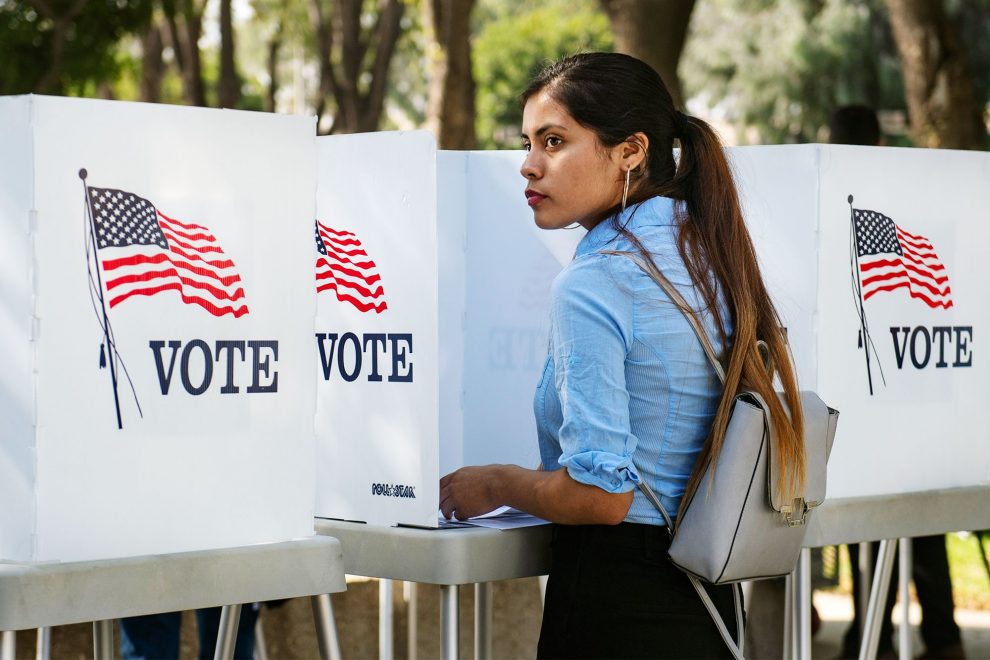Naina Agrawal-Hardin is only 17, but she feels like her generation is running out of time.
The Ann Arbor, Mich., native, an organizer with the youth-led climate group Sunrise Movement, is a member of Generation Z, the cohort of voters born after 1996 that has already witnessed a lifetime’s worth of political upheaval.
Like many of her peers, the political and economic context in which she grew up pushed Agrawal-Hardin toward progressive beliefs.
“Gen Z, many of us have lived through two or three recessions, through the 2016 election, through a terribly mismanaged global pandemic, also against the shadow of the looming climate crisis, which we inherited in a way that feels unfair,” Agrawal-Hardin told The Hill. “With each of those different events that are universal across the American Gen Z experience, we’ve seen our government put profits above the wellbeing of people and of the common good….We have no choice but to demand better of our government.”
But Gen Z has not always found the Democratic Party to be a reliable ally in making those demands. While Gen Z voters are often progressive, youth activists and organizers are not yet sold on a party many feel does not listen to them and is unsure of how to communicate with them.
Two decades worth of climate inaction, mass shootings, widening income inequality and ballooning tuition costs, expedited by a triple threat of health, economic and racial crises this year, has shaped Gen Z’s political identity.
According to a Pew Research Center study published in May, Gen Z is the country’s most pro-government, anti-Trump generation — and 24 million of them will be eligible to vote on Nov. 3.
Seventy percent of Gen Z survey respondents told Pew they want an activist government. Only 14 percent believe the U.S. is better than all other countries and just 22 percent of eligible Gen Z voters said they planned to cast a vote for President Trump in November.
On top of that, Gen Z is the most racially and ethnically diverse generation in U.S. history — barely half, at 52 percent, identify as non-Hispanic white.
Those statistics could spell generational doom for the GOP, experts said. Even Gen Zers who identify as Republicans are much more likely to hold socially liberal views, including a belief that climate change is a man-made phenomenon and that racism is still prevalent in American society.
“Republicans are in very deep trouble when it comes to appealing to young people,” said Melissa Deckman, a political scientist writing a book on Gen Z. “I talk to a lot of Gen Z activists, and I’ll ask them, what can the Republican Party do? And most of them will say, it’s beyond help.”
But the Democratic Party has not necessarily captured the demographic in the way their policy preferences would suggest they should.
Gen Z voters certainly prefer Democrats to Republicans. July polling from NextGen America, a progressive advocacy group that works to mobilize young voters, found that only 27 percent of Gen Z respondents identified as Republicans, while Democratic Party identification stood at 45 percent, with 28 percent of those calling themselves “strong Democrats.”
Favorability ratings for the Democratic Party stood at 53 percent, with 23 percent of voters expressing very favorable opinions of the party.
But interviews with over a dozen young voters, generational researchers and organizers from youth advocacy organizations revealed Gen Z remains skeptical of a party they feel has taken them for granted and does not know how to communicate with them.
While many plan to vote for presumptive Democratic nominee Joe Biden, they have made it clear both he and the party need to do more to earn their support.
In NextGen’s polling, 56 percent of young voters disagreed with the statement: “The more I hear about Joe Biden, the more I like him.” Gen Z overwhelmingly supported progressive Sen. Bernie Sanders (I-Vt.) in the Democratic presidential primary, rebuking Biden — CNN exit polls in California, for example, found that Biden received just 6 percent of the under-30 vote compared to a whopping 68 percent for Sanders.
“Young people are issues-first voters,” eight progressive youth groups wrote in an April letter to Biden demanding he commit to a slew of progressive policies, including “Medicare for All” and the Green New Deal. “Fewer identify with a political party than any other generation. Exclusively anti-Trump messaging won’t be enough to lead any candidate to victory. We need you to champion the bold ideas that have galvanized our generation and given us hope in the political process.”
From their consumer habits to their political preferences, Gen Z values and rewards authenticity, said Jason Dorsey, president and lead Gen Z researcher at the Center for Generational Kinetics. They can tell when candidates are not genuinely invested in the issues they care about or cannot communicate it in ways that resonate with that desire for authenticity.
With brands, Gen Z rewards companies that they feel stand for more than just making money and are committed to the same causes as they are — social justice, fighting climate change and increasing diverse representation. They see what happened to millennials, who are saddled with student loan debt and still face climate change and injustice, as a cautionary tale, and want to avoid a similar fate.
In a world of brands competing for their loyalty, Gen Zers do not feel like establishment Democrats, including Biden, have made authentic overtures to them or given them a voice. Biden’s age, 77, is not to blame either — through promoting policies popular with young people, engaging them directly and possessing an unrehearsed quality that resonates with Gen Z, Sanders, at 78, came across as a genuine spokesperson for young voters.
Story cited here.
























